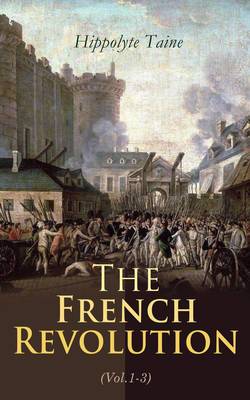Читать книгу The French Revolution (Vol.1-3) - Taine Hippolyte - Страница 25
На сайте Литреса книга снята с продажи.
I.—Anarchy from July 14th to October 6th, 1789
ОглавлениеTable of Contents
Destruction of the Government.—To whom does real power
belong?
However bad a particular government may be, there is something still worse, and that is the suppression of all government. For, it is owing to government that human wills form a harmony instead of chaos. It serves society as the brain serves a living being. Incapable, inconsiderate, extravagant, engrossing, it often abuses its position, overstraining or misleading the body for which it should care, and which it should direct. But, taking all things into account, whatever it may do, more good than harm is done, for through it the body stands erect, marches on and guides its steps. Without it there is no organized deliberate action, serviceable to the whole body. In it alone do we find the comprehensive views, knowledge of the members of which it consists and of their aims, an idea of outward relationships, full and accurate information, in short, the superior intelligence which conceives what is best for the common interests, and adapts means to ends. If it falters and is no longer obeyed, if it is forced and pushed from without by a violent pressure, it ceases to control public affairs, and the social organization retrogrades by many steps. Through the dissolution of society, and the isolation of individuals, each man returns to his original feeble state, while power is vested in passing aggregates that like whirlwinds spring up from the human dust.—One may divine how this power, which the most competent find it difficult to apply properly, is exercised by bands of men springing out of nowhere. It is a matter of supplies, of their possessions, price and distribution. It is a matter of taxes, its proportion, apportionment and collection; of private property, its varieties, rights, and limitations It is a problem of public authority, its allocation and its limits; of all those delicate cogwheels which, working into each other, constitute the great economic, social, and political machine. Each band in its own canton lays its rude hands on the wheels within its reach. They wrench or break them haphazardly, under the impulse of the moment, heedless and indifferent to consequences, even when the reaction of to-morrow crushes them in the ruin that they cause to day. Thus do unchained Negroes, each pulling and hauling his own way, undertake to manage a ship of which they have just obtained mastery.—In such a state of things white men are hardly worth more than black ones. For, not only is the band, whose aim is violence, composed of those who are most destitute, most wildly enthusiastic, and most inclined to destructiveness and to license. But also, as this band tumultuously carries out its violent action, each individual the most brutal, the most irrational, and most corrupt, descends lower than himself, even to the darkness, the madness, and the savagery of the dregs of society. In fact, a man who in the interchange of blows, would resist the excitement of murder, and not use his strength like a savage, must be familiar with arms. He must be accustomed to danger, be cool-blooded, alive to the sentiment of honor, and above all, sensitive to that stern military code which, to the imagination of the soldier, ever holds out to him the provost's gibbet to which he is sure to rise, should he strike one blow too many. Should all these restraints, inward as well as outward, be wanting, the man plunges into insurrection. He is a novice in the acts of violence, which he carries out. He has no fear of the law, because he abolishes it. The action begun carries him further than he intended to go. Peril and resistance exasperate his anger. He catches the fever from contact with those who are fevered, and follows robbers who have become his comrades.1301 Add to this the clamors, the drunkenness, the spectacle of destruction, the nervous tremor of the body strained beyond its powers of endurance, and we can comprehend how, from the peasant, the laborer, and the bourgeois, pacified and tamed by an old civilization, we see all of a sudden spring forth the barbarian. Or still worse, the primitive animal, the grinning, sanguinary, wanton baboon, who giggles while he slays, and gambols over the ruin he has accomplished. Such is the actual government to which France is given up, and after eighteen months' experience, the best qualified, most judicious and profoundest observer of the Revolution will find nothing to compare it to but the invasion of the Roman Empire in the fourth century.1302 "The Huns, the Heruli, the Vandals, and the Goths will come neither from the north nor from the Black Sea; they are in our very midst."
